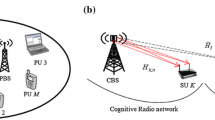Abstract
Dynamic resource allocation in an orthogonal frequency division multiplexing (OFDM) based cognitive radio (CR) system is an important challenge since several parameters (i.e. primary users (PUs) activity, the interference and main channel gain) are involved in this. This problem is more significant in a cognitive radio scenario when perfect channel state information (CSI) is not available at secondary users (SU)’s transmitters. Channel estimation error and feedback channel propagation delay are two source that provide the channel uncertainty. In this paper, resource allocation problem considering hybrid sharing scheme with uncertainty assumptions for the interference channel gain is investigated. First, sensitivity of optimal solution is evaluated under the interference channel uncertainty. It is found that the determination of the Lagrangian variables in a multiuser network acquires a complex iterative method since the number of constraints is increased by the size of PU’s network linearly. Moreover, an idle subcarrier grouping approach is proposed to deal with such a complex iteration problem. The resource allocation with imperfect CSI of the interference channel is discussed and a suboptimal solution is proposed. The numerical results show that the SU’s capacity is improved for two proposed schemes compared with the conventional algorithms. Indeed, the interference power level is unchanged by increasing the transmit power for the proposed algorithms.
Similar content being viewed by others
References
N. Devroye, P. Mitran, and V. Tarokh, “Limits on communications in a cognitive radio channel,” IEEE Commun. Mag., No. 44, 44–49 (2006).
Q. Zhao and B. Sadler, “Dynamic spectrum access: signal processing, networking, and regulatory policy,” IEEE Signal Process. Mag., No. 24, 79–89 (2007).
R. Etkin, A. Parekh, and D. Tse, “Spectrum sharing for unlicensed bands,” IEEE J. Sel. Area Commun., No. 25, 517–528 (2007).
S. Haykin, “Cognitive radio: brain-empowered wireless communications,” IEEE J. Sel. Areas Commun., No. 23, 201–220 (2005).
G. Bansal, J. Hossain, V. K. Bhargava, and T. Le-Ngoc, “Subcarrier and power allocation for OFDMA-based cognitive radio systems with joint overlay and underlay spectrum access mechanism,” IEEE Trans. Veh. Technol., 62, 1111–1122 (2013).
Chengshi zhao, Mingrui zou, and Kyungsupkwak, “Mutual interference considered power allocation in OFDM-based cognitive networks: the multiple SUs case,” Ann. Telecom., No. 65, 341–351 (2010).
X. Kang, Y. C. Liang, A. Nallanathan, H. K. Garg, and R. Zhang, “Optimal power allocation for fading channels in cognitive radio networks: ergodic capacity and outage capacity,” IEEE Trans. Wireless Commun. 8, 940–950 (2009).
E. Hosseini and A. Falahati, “Improving water-filling algorithm to power control cognitive radio system based upon traffic parameters and QoS,” Wireless Pers. Commun., No. 70, 1747–1759 (2013).
E. Hosseini and A. Falahati, “Power allocation grouping scheme with considering constraints in two separate stages for OFDM-based cognitive radio system,” in Proc. Int. Conf. on Electrical Information and Communication Technology, (EICT 2013), Khulna, KUET, Bangladesh, Dec. 19–21, 2013 (IEEE, New York, 2014), pp. 1–6.
G. Bansal, J. Hossain, and V. K. Bhargava, “Optimal and suboptimal power allocation schemes for OFDM-based cognitive radio systems,” IEEE Trans. Wireless Commun. 7, 4710–4718 (2008).
Z. Dongmei, X. Youyun, and C. Yueming, “Linear water-filling power allocation algorithm in OFDMA system,” J. Elect. Inf. Tech., No. 29, 1286–1289 (2007).
W. Jian, Y. Longxiang, and Xu Liu, “Resource allocation based on linear waterfilling algorithm in CR systems,” in Proc. 7th Int. Conf. on Wireless Communications, Networking and Mobile Computing (WiCOM-2011), Wuhan, China, Sept. 23–25, 2011 (IEEE, New York, 2011), pp. 1–4.
Wei-Cheng Pao, Yung-Fang Chen, and Syun-Yu Chuang, “Efficient power allocation schemes for OFDM-based cognitive radio systems,” Int. J. Elect. Comm. 65, 1054–1060 (2011).
Z. Tang, G. Wei, and Y. Zhu, “Weighted sum rate maximization for OFDM-based cognitive radio systems,” Telecommun. Syst., Springer (2009).
C. Zhao and K. Kwak, “Power/bit loading in OFDM-based cognitive networks with comprehensive interference considerations: the single-SU case,” IEEE Trans. Veh. Tech. 59, 1910–1922 (2010).
M. R. Mili and K. A. Hamdi, “Minimum BER analysis in interference channel,” IEEE Trans. Wireless Commun. 12, 3191–3201 (2013).
Author information
Authors and Affiliations
Corresponding author
Additional information
The article is published in the original.
Rights and permissions
About this article
Cite this article
Hosseini, E., Falahati, A. Resource allocation schemes with subcarriers grouping approach over an orthogonal frequency division multiplexing-based cognitive radio system considering the channel uncertainty. J. Commun. Technol. Electron. 59, 1369–1377 (2014). https://doi.org/10.1134/S1064226914120067
Received:
Published:
Issue Date:
DOI: https://doi.org/10.1134/S1064226914120067




